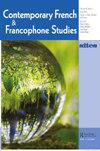Translating “Maoist China”: The Development of French Maoism through Literary Translation
IF 0.2
4区 文学
0 LITERATURE, ROMANCE
引用次数: 0
Abstract
Abstract The translation of Chinese literature brought Mao Zedong thought and the Chinese revolutionary spirit to France in the 1960s, giving rise to the development of French Maoism. The translation conducted by French left-wing intellectuals focused on Mao’s literary works and other left-wing revolutionary literature, which encouraged French avant-garde writers to project an image of idealized “Maoist China” onto the land of France, with an ambition to promote social and political reforms at home. Utopian fantasies about Chinese literature and politics drove the development of French Maoism, but the disintegration of spontaneous Maoist organizations and the trips to China allowed pro-Maoist intellectuals to recognize their idealized misinterpretation of China gradually.翻译 "毛泽东主义的中国":通过文学翻译发展法国毛泽东思想
摘 要 20 世纪 60 年代,中国文学翻译将毛泽东思想和中国革命精神带到法国,催生了法国毛泽东主义的发展。法国左翼知识分子翻译的重点是毛泽东的文学作品和其他左翼革命文学作品,这鼓励法国先锋派作家将理想化的 "毛泽东主义中国 "形象投射到法国土地上,并雄心勃勃地推动国内的社会和政治改革。对中国文学和政治的乌托邦幻想推动了法国毛泽东主义的发展,但毛泽东主义自发组织的解体和中国之行让亲毛泽东主义的知识分子逐渐认识到他们对中国的理想化误读。
本文章由计算机程序翻译,如有差异,请以英文原文为准。
求助全文
约1分钟内获得全文
求助全文
来源期刊

Contemporary French and Francophone Studies
LITERATURE, ROMANCE-
CiteScore
0.30
自引率
0.00%
发文量
43
期刊介绍:
An established journal of reference inviting all critical approaches on the latest debates and issues in the field, Contemporary French & Francophone Studies (formerly known as SITES) provides a forum not only for academics, but for novelists, poets, artists, journalists, and filmmakers as well. In addition to its focus on French and Francophone studies, one of the journal"s primary objectives is to reflect the interdisciplinary direction taken by the field and by the humanities and the arts in general. CF&FS is published five times per year, with four issues devoted to particular themes, and a fifth issue, “The Open Issue” welcoming non-thematic contributions.
 求助内容:
求助内容: 应助结果提醒方式:
应助结果提醒方式:


